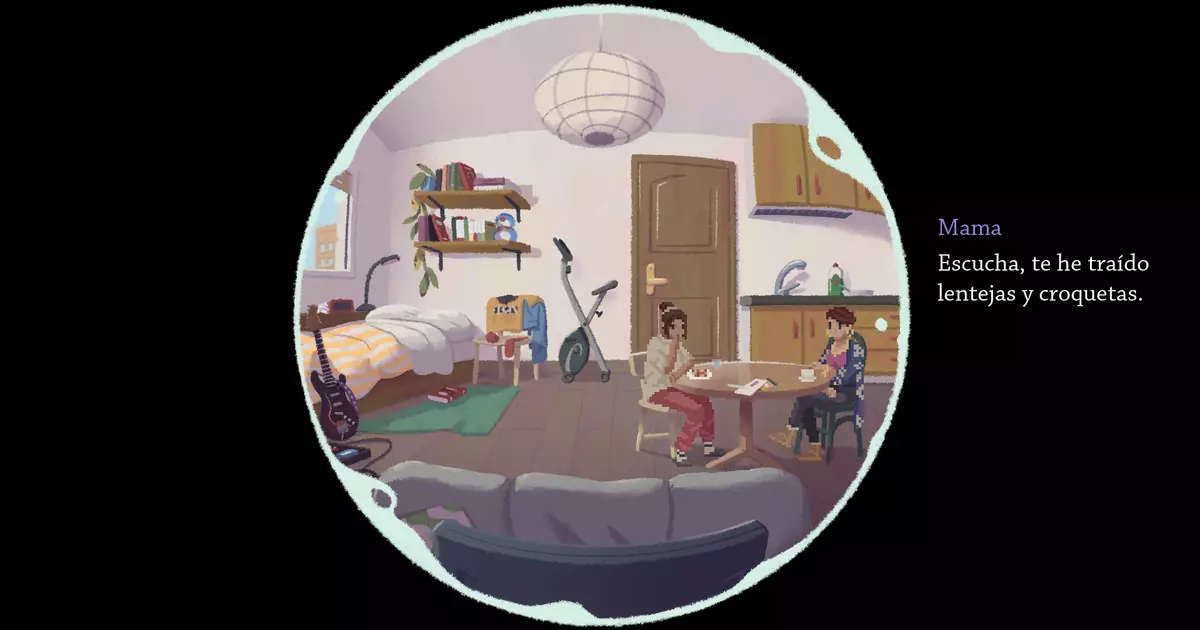Burnout can be a silent killer of creativity and motivation, often leaving individuals trapped in a cycle of exhaustion and disillusionment. In this landscape, the video game “Vendrán Las Aves,” co-created by Francisco Riolobos, Chuso Montero, and their team at Deconstructeam, offers a refreshing yet poignant perspective on the struggle for recovery. Set within a reflective two-dimensional world, the game portrays a relatable narrative of self-discovery amidst chaos, delivering an experience that’s both mindful and engaging.
“Vendrán Las Aves,” which translates to “The Birds Will Come,” invites players to explore a simple yet profound journey: aiding a character in their recovery from burnout in a minimalistic setting. Displayed through a snowglobe lens that reflects the character’s solitary apartment, the game captures the essence of living with both internal and external pressures. Upon leaving a demanding job, our protagonist has impulsively purchased a guitar, symbolizing hope and a desire for rejuvenation. However, juxtaposed with this enthusiasm is a paralyzing exhaustion that keeps them confined within the walls of their small space.
At its core, the gameplay revolves around effective resource allocation, where the player must manage finite energy points each day. Each action—from eating to doing laundry—affects the character’s ability to function and progress. Striking a balance between self-care and the inertia of burnout isn’t just a gameplay mechanic; it mirrors the reality many face when overloaded by life’s demands.
One of the game’s most impressive qualities is its understated emphasis on seeking help. As players navigate the character’s daily challenges, opportunities arise to welcome support from others—family or friends who bring care packages or simply offer companionship. This notion aligns with the real-world understanding that recovery is often not a solitary journey but one enriched by external support systems. By incorporating these elements into gameplay, “Vendrán Las Aves” subtly reminds us that reaching out for help is both a strength and a necessity.
The experience is reminiscent of self-care narratives that portray life as an intricate balance of responsibilities and rest, acknowledging days where merely getting out of bed feels like an achievement. It taps into a universal experience that fosters a sense of understanding and validation among players who have navigated similar struggles.
Burnout often incites a clash of emotions, ranging from numbness to urgency. In “Vendrán Las Aves,” this emotional complexity is responded to through gameplay, presenting a fair approximation of what many individuals might feel during their low periods. From the frustration of mundane tasks to the simplistically uplifting nature of minor achievements, the game encapsulates a deep well of relatable emotions. Additionally, the character’s love for their craft—an allusion to the artistic spirit—offers a narrative depth, indicating that burnout is not merely about the job or its demands but about the relationship individuals have with their passion and creative pursuits.
The categorization of the game as a “slice of life tamagotchi” could be debated, especially considering the depth of the narrative and its vulnerability. While some comparisons may arise with games like Zoe Quinn’s “Depression Quest,” “Vendrán Las Aves” diverges from traditional gaming conventions by offering a lens into daily life rather than positioning the player as an overarching problem solver. This focus creates a gentler narrative experience, allowing room for introspection without the pressure of achievement.
While “Vendrán Las Aves” is undoubtedly a thoughtful exploration of burnout, it should not be mistaken for a mental health resolution guide. It serves more as a means for understanding rather than a practical resource for recovery. For those seeking genuine help, organizations like Mind UK offer valuable information for navigating these turbulent waters.
“Vendrán Las Aves” emerges as a cozy yet unguarded portrayal of burnout recovery, where players engage with their character in a way that encourages compassion. Like a gentle whisper promising that after the storm, the birds will someday return, the game provides a hopeful perspective amidst the shadows of despair. The journey is not about finding immediate solutions but understanding that each day presents an opportunity for gradual healing—a key takeaway in today’s fast-paced world.


Leave a Reply